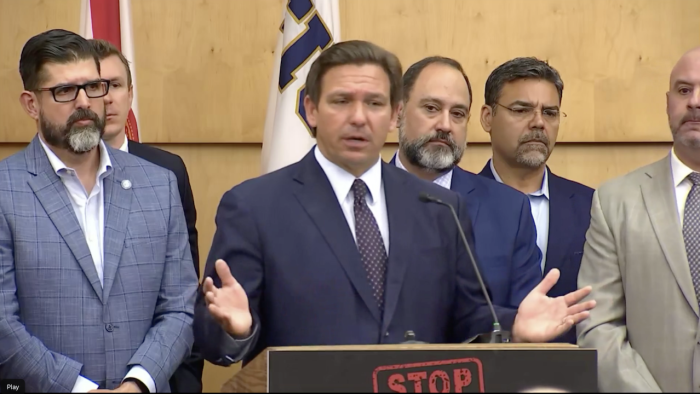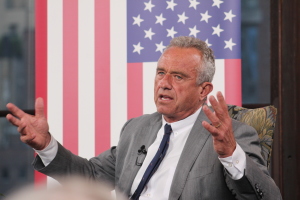Florida gov. signs bill to punish Big Tech 'censorship' and 'totalitarianism,' allow residents to sue
DeSantis says bill will protect Floridians from 'Silicon Valley elites'

Big Tech companies will now be held accountable and face lawsuits or fines for censorship through a new law in the Sunshine State that protects Floridians from the "totalitarianism" of Big Tech oligopolies.
Florida's Republican Gov. Ron DeSantis signed Senate Bill 7072 in Miami on Monday to hold Big Tech accountable, require transparency and protect the ability of Floridians to participate freely in online platforms.
“This session, we took action to ensure that ‘We the People’ — real Floridians across the Sunshine State — are guaranteed protection against the Silicon Valley elites,” DeSantis said in a statement.
“Many in our state have experienced censorship and other tyrannical behavior firsthand in Cuba and Venezuela,” he continued. “If Big Tech censors enforce rules inconsistently, to discriminate in favor of the dominant Silicon Valley ideology, they will now be held accountable.”
Under this law, which will go into effect on July 1, Floridians treated unfairly by Big Tech platforms will have the right to sue companies that violate the law.
It protects Floridians’ rights by requiring social media companies to be transparent about content moderation to prevent Big Tech from silencing viewpoints.
It also gives the attorney general of Florida the ability to take action against technology companies that violate the law under Florida’s Unfair and Deceptive Trade Practices Act.
For social media platforms that violate antitrust law, they will be restricted from contracting with public entities.
The new law also prohibits Big Tech from de-platforming political candidates in Florida. The Florida Election Commission will fine $250,000 per day for de-platforming candidates running for statewide office and $25,000 for de-platforming candidates for non-statewide offices.
A provision of the bill exempts companies that own and operate a theme park or entertainment complex in Florida, such as Walt Disney Co.
The law notes how social media platforms have “unfairly censored, shadow banned, de-platformed, and applied post-prioritization algorithms to Floridians” in the past. The legislation contends that the “state has a substantial interest in protecting its residents from inconsistent and unfair actions by social media platforms” and “must vigorously enforce state law to protect Floridians.”
“Today, Floridians are being guaranteed protection against the Silicon Valley power grab on speech, thought, and content. We the people are standing up to tech totalitarianism with the signing of Florida’s Big Tech Bill,” DeSantis tweeted on Monday.
Today, Floridians are being guaranteed protection against the Silicon Valley power grab on speech, thought, and content. We the people are standing up to tech totalitarianism with the signing of Florida’s Big Tech Bill. https://t.co/cDewFJiEPk
— Ron DeSantis (@GovRonDeSantis) May 24, 2021
Liberty Counsel, a Florida-based legal organization that engages in litigation related to evangelical Christian values, praised DeSantis for protecting freedom of speech through this legislation.
“We commend Governor Ron DeSantis for his excellent leadership and for protecting the freedom of speech for Floridians,” Liberty Counsel Chairman Mat Staver said in a statement.
“Gov. DeSantis has set a great example for all other governors, and we are encouraged to see others follow this path,” Staver continued. “We must protect free speech. Florida is leading the way to stop the abuses that happen when the Silicon Valley elites censor the free flow of ideas. Censorship is un-American and the antithesis to freedom.”
DeSantis, who called Florida “America’s West Berlin” and a “free zone,” said other states will follow Florida’s lead in holding Big Tech corporations accountable.
“Florida is the first state to hold Big Tech accountable by empowering each and every Floridian silenced by arbitrary corporate censorship to fight back,” DeSantis said during the press conference on Monday. “This is a groundbreaking bill that protects Floridians from Silicon Valley’s power grab. They are exerting a power that really has no precedent in American history.”
One reporter asked DeSantis if the bill was written to protect former President Donald Trump, a Florida resident.
“The bill is for everyday Floridians. This is what we said,” DeSantis responded. “But I do think that is another issue that has been brought to bear. When you de-platform the president of the United States, but you allow [Iranian leader] Ayatollah Khomeini to talk about killing Jews, that is wrong.”
Trump was de-platformed from all major social media platforms this year and has since created his personal social media platform.
Conservative activist James O’Keefe, who was recently suspended by Twitter, was on stage with DeSantis during the bill signing in Miami, Politico reported.
O’Keefe is the controversial and often-sued founder of Project Veritas, which is a media organization that engages in undercover journalism that it claims exposes corruption.
Critics have denounced the legislation, saying it is a violation of the First Amendment and will undergo legal challenges.
“I think that it’s pretty clear that this is mostly political,” Aubrey Jewett, a professor of political science at the University of Central Florida, said, according to The Orlando Sentinel. “It’s about appealing to Republicans and conservatives and Trump supporters who really feel that Big Tech has been terribly unfair to conservatives. And it’s somewhat beside the point if it actually withstands legal challenge.”
Jewett said this could inhibit the attempt of local governments to attract tech firms to Florida.
On the federal level, several GOP lawmakers, including Sen. Josh Hawley, R-Mo., and Sen. Ted Cruz, R-Texas, are outspoken about the abuses of Big Tech and its negative impact on free speech.
Hawley released a bestselling book this month called The Tyranny of Big Tech, highlighting the abuses of the “techno-oligarchy with overwhelming economic and political power.”
Emily Wood is a reporter for The Christian Post. She can be reached at: emily.wood@christianpost.com




























